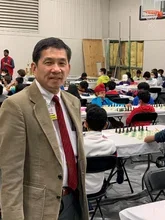Fun Fong's candidate statements also appear in the Chess Life issues under which they are listed below.

April Statement:
I’m Dr. Fun Fong and it has been my privilege to serve as your Executive Secretary for the past three years. US Chess’ credibility stems from its strong fiscal standing over the last few years. I want to maintain this fiscal strength as a first priority.
Every US Chess event should be a volunteer recruitment opportunity. We should incorporate new volunteers and talent into low-consequence organizational positions. Incorporation of new volunteers will grow and develop US Chess leadership.
There is more activity in both Open and Scholastic OTB chess events. We should brainstorm about how US Chess could modify their event offerings to accommodate this new enthusiasm. If the trend continues, we should enact a plan of action, perhaps adding one additional full-time equivalent position for Events.
A dreamer, I would like to see US Chess with twice the number of organizationally active members within the next five years.
May Statement:
Dear US Chess Federation members,
As I seek re-election to the US Chess Executive Board, I am asking for your support. Serving as your Executive Secretary has been a tremendous honor, and I am excited to continue my work at the national level while also dedicating my efforts to rebuilding chess in my home state.
I bring to the board my background as an emergency physician, which allows me to approach chess governance with a fresh perspective. During my first term, I served as board liaison on the Correspondence Chess Task Force, where I demonstrated my ability to facilitate consensus. Additionally, I am the primary board liaison for the Development Committee, where we are exploring strategic partnerships to enhance the US Chess experience for our members.
As part of my re-election platform, I am advocating for the creation of Chess Interest Groups (CIGs), a structure that commonly exists in larger membership organizations. This structure would empower US Chess members to form sub-organizations within US Chess when sufficient interest is demonstrated and approval by governance is obtained. This structure would add richness to the US Chess membership experience. CIGs would help build a deeper bench of US Chess leadership, where potential leaders can demonstrate superior organization and activity. I recognize that this concept may take time for organizational leadership to accept and understand, and I am commit ted to patiently working toward consensus.
I would like to double the $150K fund for the Professional Player Health Benefit Claims Committee through targeted fund raising efforts over time. As the primary liaison for this committee, I understand the importance of providing support for our professional players.
While I appreciate the Executive Board's focus on day-to-day operations and member conflicts, I believe that we need to devote more energy to long-term planning. We must consider various hypothetical scenarios and think more concretely about a three to five-year time horizon on a regular basis.
US Chess is the guardian of over-the board chess, maintaining an even playing field for competition, and ensuring a positive environment for both competitive and social play. I would be honored to receive your vote in the upcoming election to continue the commitment to US Chess I have demonstrated these past years.
To learn more about my accomplishments as president of the Georgia Chess Association and to continue the conversation, please feel free to contact me on Facebook at Fun Fong, MD FACEP, US Chess Executive Secretary.
Thank you for your consideration and your support.
June Statement:
Our meeting in St. Louis was a good meeting, “a strategic planning session” where we had plenty of time for brainstorming and reflecting on the many challenges US Chess faces. It’s important to put it into a grand perspective.
We developed Safe Play guidelines a few years ago and we need to continue to refine the guidelines on an ongoing basis. From the full spectrum from the disruptive, unruly player, to allegations of sexual misconduct, assaults, we must always strive to provide a better environment for our players. We have higher expectations for good behavior in our playing ranks. We need to think in terms of developing indexes for ongoing continuous quality improvement ranging anywhere from staff quality to player satisfaction. Collecting subjective comments is not enough for organizations in the information age.
My visits to the US Amateur Team East and the Georgia Chess Association’s State Championship impressed upon me local nuances that are reflective of national trends. We are seeing the pleasant appearance of young adult players within our ranks. I think this is the result of 1) The Queen’s Gambit, 2) over 100 million online chess players, 3) the impact of chess content creators, and 4) the audience created by the Sinquefield sponsored elite tournaments. Most of us think we may understand our trends, but we need data analytics to verify what we only think we know and to fully understand the impact. We need to take advantage of this renewed interest in chess and find ways to retain our new players. US Chess to be in touch with the trends of today’s chess.
US Chess needs to increase and strengthen its leadership cadre in the face of increasing membership. We should welcome new members into leadership roles who demonstrate an ability to lead, while also being able to work and play well with others. I would like US Chess to be more systematic and active in the training of its leadership at the state and the national level. I pledge to engage our national leaders and to remind them that we are ALL here for the betterment of chess, to increase our membership, and to implement its mission of improving lives through chess. If you send me back to the Executive Board, I will find a pathway that helps leadership and committees achieve successful outcomes.







